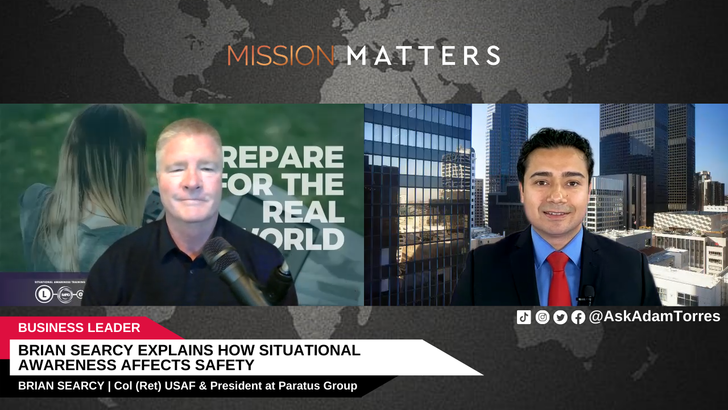The mission behind Paratus Group
At the Paratus Group, Searcy and his team focus on teaching situational awareness with regard to safety in crisis situations.
“We're trying to empower the ability to learn situational awareness to prevent bad things from happening,” Searcy says. When you learn situational awareness as a process, he explains, you are not only able to prevent bad things from happening; you prepare yourself to respond as well.
“We are on a mission to educate people that the traditional training we have been doing for over 30 years doesn’t work, and you don’t learn situational awareness and are not educated about the threats; you need to have a training program that empowers people to learn habits, behaviors, a new mindset, and processes that surround situational awareness. As threats are on the rise, we need to change the paradigm of how we deal with them.”
Listen to the complete interview of Brian Searcy with Adam Torres on Mission Matters Business Podcast.
What is situational awareness?
Situation awareness, Searcy explains, is the experience of knowing what's going on around you, using a variety of perceptive abilities to understand what’s happening. Using it as a cornerstone of its programs, Paratus Group focuses on ten critical skills, including self-awareness, perception, perspective, active listening, critical thinking, learning agility, decisiveness, communication, humility and empathy.
One process Searcy recommends is running through hypothetical crisis situations and asking, "Okay, if anything bad happened today, what would I do?" The repetition of exercises like this, he explains, are an example of how you develop “a habit and a mindset.”
What does the Paratus Group do?
Paratus Group co-creates courses with businesses, schools and churches, providing programs to train the leadership and the team members. In addition, the Paratus Group has specific programs - for parents, high school students, college students, and those that want to secure their home to learn how to develop and engage in situational awareness. "It's a skill that parents haven't learned for a long time,” he says. “We want to empower parents and organizations to learn this critical skill and pass it on to those around them."
"We're introducing real-world content so that everything that the learner is getting is personal to them in the real world,” Searcy says. ”That's what makes our program unique, because we leave all rooms open for discussion.”
The road ahead
When asked about what the road ahead looks like, Searcy notes, "I would love the opportunity to do keynote speaking or educate people initially about situational awareness, and why do we have to have it, how it applies to mental health, and how also, as I said, you can't be an effective leader, you can't be an effective parent or grandparent, without situational awareness. So it's an education process, but then allow them to figure out that you can't do that traditional training and that you have to have a program, whether it's ours or somebody else's."
To learn more about Paratus Group. visit www.paratus.group or email [email protected].
Media Communications
Inquiries: [email protected]
Publicist for Adam Torres and Mission Matters Media KISS PR Brand Story PressWire
Brand Publicity Partners KissPR.com
For more details, visit Kisspr.com Content Marketing for podcasters. KISS PR Digital PR & Marketing powers the Mission Matters Business podcast with brand storytelling. T: 972.437.8942
Source: Adam Torres / Co-Founder
Release ID: 36909

